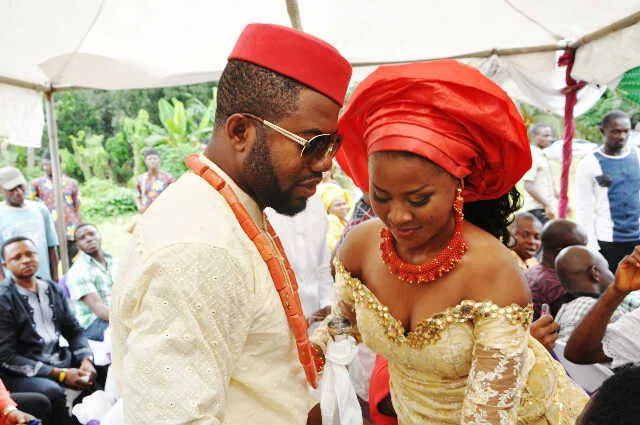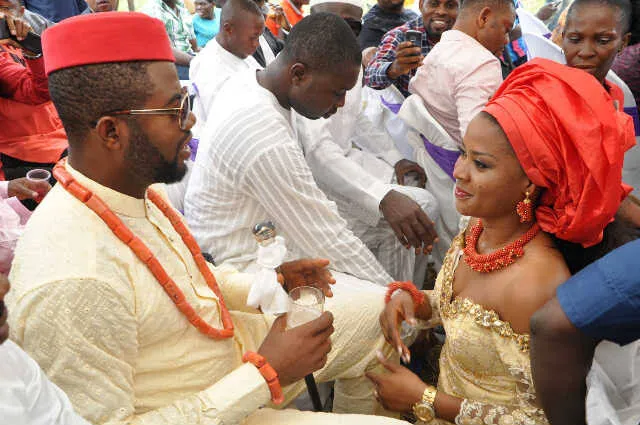Greetings Hive Learners.....!
Today I will be making a Post about the traditional marriage of the igboland. How marriage process is being done or carried out in Igbo land.
Before I continue I want to tell us some few steps about the traditional marriage rites in igboland. They are actually five steps to follow when doing the traditional marriage in igboland. And it should be carried out in that process before the white wedding can commenced (church marriage)



First Step
Introduction/Knocking On The Door (Ikụ Aka n’ Uzo)
In this first stage of the marriage is the announcement of the birth family the groom will visit the Bride family with his parents, some elders and some family members to inform the bride's family of his intentions to marry their daughter, and they will have to go with some alcoholic drinks. in the other hand the bride family will wait for their arrival to welcome the groom and his family. On the arrival they will be presented with some kola nut (this and Igbo welcome gesture) after that they groom father will make his son's intention known to the bride's family, then the Bride father will tell them that he will get back to them after discussing with his daughter.
Second Step
Family background investigations (Iju Ajuju)
In the second stage, the both families involved who do a background check to find out more about their families. The two families involved are to conduct their investigation separately,
The groom might have started their investigation before the first visit. while the Bride will start their investigation after the first visit from the groom.
This investigation from both families helps to uncover the lineage of each family where they come from, family blood type, family religious practices, family character, family stands in the society, family dynamics, family general health information.
Third Step
Follow-Up Visit For The Discussion/Collection Of Bridal List (Ihu Isi Nwanyi)
In this third stage, it starts immediately after the families have concluded their investigations.
This is where the write father will call his daughter in front of their guest to tell her their intentions if they should accept the groom. Then the Bride will have to nod her head and say yes they should go on and accept.
Then the bride's family will now present a list to the groom's family.
The Bridal List includes items for the bride’s parents and community; the men (Umunna), the women (Umuada) and the young adults (Umu youth).
The Bridal List includes items such as:
- Large Stock fishes
- Tubers of yam (amount differs from each community)
- Cash gifts
- Kola nuts
- Fruits
- Large bags of rice
- Specified number of alcoholic drinks and Soft drinks
- Goats/Cows
- Bags of beans
- George wrappers, High-end Ankaras, and head-ties
- Tobacco Head
- Large Talcum powder
- Bags of onions
- A bag of salt
- Two pairs of shoes
- wristwatch
- A bar of bathing soap
- One large basin
- Jewelry for the mother
- Luggage bags
- Handbags
- Toiletries and many more.
Fourth Step
Dowry Negotiations/Payments (Ego Isi Nwanyi)
In this fourth stage, the two families will sit and discuss the diary amount to be paid, There is no set amount for the dowry as it’s up to the two families to decide on how much it will be. And the list is from the demands of the village and the family members. And is not also a must that everything in the list must be completed. The groom have to do base on his budget. Especially when the bride's family are understanding.
Fifth Step
The Traditional Wedding Ceremony (Igba Nkwụ)
This is the final stage of the marriage. The traditional wedding ceremony which is open for everyone to attend. In igboland it is called Igba Nkwu (The Wine Carrying Ceremony) and is the most important part of the traditional wedding ceremony process where the bride dance around in search of her groom, carrying the wine given by her father to look for her groom. Once she finds her groom, she will kneel down take a sip of the wine and give it to the groom and the groom will collect the wine and drink. and both of then will dance together to meet the bride's father for blessings.
Thanks for coming to my blog







